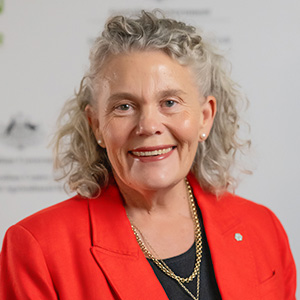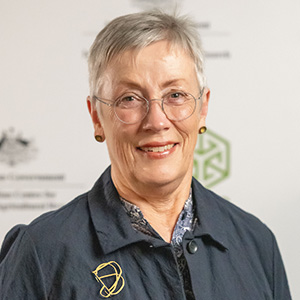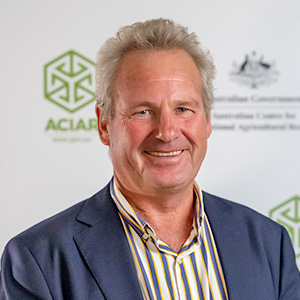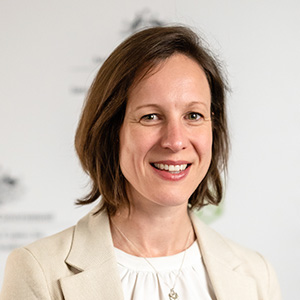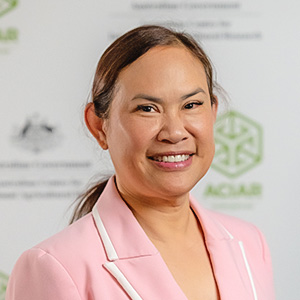- HomeHome
-
About ACIAR
- Our work
- Our people
-
Corporate information
- ACIAR Audit Committee
- Commission for International Agricultural Research
- Policy Advisory Council
- Agency reviews
- Executive remuneration disclosure
- Freedom of information (FOI)
- Gifts and benefits register
- Information publication scheme
- List of new agency files
- Contracts
- Legal services expenditure
- Privacy impact assessment register
- Commonwealth Child Safe Framework
- Benefits to Australia
- Careers
- 40 years of ACIAR
-
What we do
- Programs
- Cross-cutting areas
- Resources
- Where we work
-
Funding
- Research projects
- Fellowships
-
Scholarships
- John Allwright FellowshipScholarships to study in Australia for ACIAR partner country scientists to have Australian postgraduate qualifications
- ACIAR Pacific Agriculture Scholarships and Support and Climate Resilience Program
- Alumni Research Support Facility
- Publications
- News and Outreach
Commission for International Agricultural Research
The Commission for International Agricultural Research is established under the Australian Centre for International Agricultural Research Act 1982 (Section 7). It comprises seven Commissioners who provide collective decision-making and expert advice to the Minister for Foreign Affairs in relation to program formulation for agricultural research and development, priority setting, funding and other matters as requested by the Minister. Commissioners are appointed on a part-time basis for a period of up to three years. To fulfil its role, the Commission meets a minimum of four times each financial year.
Mrs Fiona Simson GAICD, BA (chair)
Mrs Fiona Simson is a farmer from the Liverpool Plains in NSW, where she and her family run a mixed farming enterprise including cattle and broad acre farming.
Following a term in local government she has been an agricultural industry leader at both a state and federal level since 2008, and now internationally as a Director of the World Farmers’ Organisation. Fiona was elected to the board in May 2023 to represent farmers from Australia and New Zealand in the Oceania Constituency.
She served as the first female President of the National Farmers Federation (NFF) from 2016 to 2023, striving to create opportunities for more women and young people to become involved in the industry. She was instrumental in the launch of the NFF’s first Diversity in Ag Leadership Programme in 2018. Fiona also spearheaded NFF’s 2030 $100 billion Vision, and led new approaches to the stewardship of natural capital and biodiversity and the Telling our Story Trust, building connections between farmers and consumers.
She is a Director on the Boards of Australian Made Australian Grown, NRMA (NSW), Future Food Systems CRC and One Basin CRC and is a Patron of the National Rural Press Club and Gunnedah Gatepost Community Support.
Image
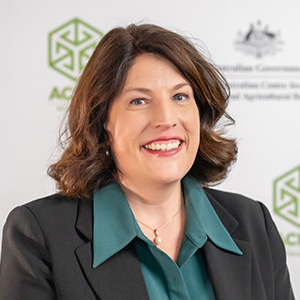
Professor Wendy Umberger
Professor Umberger has played influential roles in sustainable agriculture for over 20 years. From 2013 to 2022, she founded and led the Centre for Global Food and Resources at the University of Adelaide, which engaged with policymakers and industry to make positive changes in agriculture, food, and resource systems. Professor Umberger has also served as President of Australia's Policy Advisory Council (for International Agricultural Research and Development) from 2020 to 2023 and was on the Board of Trustees of the International Crops Research Institute for Semi-Arid Tropics (ICRISAT) from 2015 to 2021.
Professor Umberger is an Honorary Professorial Fellow in the School of Agriculture and Food at the University of Melbourne and an expert in agricultural economics, development, and food policy. She has worked on food system issues across the Indo-Pacific region and led interdisciplinary value chain research projects in Asia, Australia, North America, the Pacific Islands and South Africa. Her research has explored opportunities for smallholder agricultural households to produce high-value (horticulture, dairy, beef) food products and adopt new technology to access modern food value chains.
Professor Umberger is also a Director of the International Association of Agricultural Economists, a board member of Food Bank SA, an Honorary Fellow of Food Standards Australia New Zealand, a Distinguished Fellow of the Australasian Agricultural and Resource Economics Society and served as an Independent Director of Grain Producers South Australia (GPSA) for six years. Wendy has a B.S. in Animal Science (1996), an M.S. in Economics (1998) from South Dakota State University and a PhD in Agricultural Economics (2001) from the University of Nebraska-Lincoln.
Image
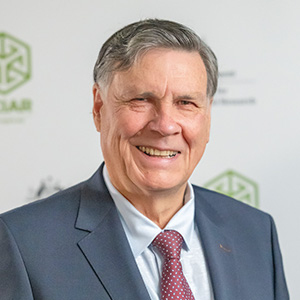
Emeritus Professor Lindsay Falvey FTSE, FAIAS
Professor Lindsay Falvey has led research and development missions and projects in dozens of countries on behalf of all major development agencies.
Beginning his agricultural career as a rouseabout on a remote Northern Territory cattle research station, Lindsay became CEO of international development consulting companies, Dean and Chair of Agriculture at the University of Melbourne, where he continues as Professor Emeritus, and a long-serving director of a major foreign agribusiness investor in Australian agriculture.
He has worked with AusAID, the World Bank, ADB, the UN and other agencies, and is the author of several agricultural science books.
Lindsay is the immediate past Board Chair of the International Livestock Research Institute, which is the CGIAR centre focused on livestock research oriented to the marginalised poor in the developing world, particularly in Africa and Asia.
Dr Beth Woods OAM FTSE
Dr Beth Woods currently chairs the Council of the Australian Institute of Marine Science.
In 2021, Beth retired as Director-General of the Queensland Department of Agriculture and Fisheries, where she led development initiatives to deliver an innovative, productive and sustainable agriculture, fisheries and forestry sector.
Previously she was the foundation Director of the University of Queensland Rural Extension Centre, and Professor of Agribusiness at UQ from 1997-2004.
Beth has served on boards and committees including for the Grains Research & Development Corporation, the CSIRO Board, the Gatton College Council and the Queensland Rural Adjustment Authority (now QRIDA). She chaired RIRDC (now AgriFutures), a National Drought Policy Review, the International Rice Research Institute and WorldFish, and was recently the inaugural independent Chair of the Policy Council of Cattle Council of Australia.
Mr Tony York
Mr Tony York is a third-generation farmer from the central Wheatbelt town of Tammin, where he farms more than 13,000 arable hectares of wheat, barley, canola, various legumes, a merino-based sheep flock and 4000 hectares of salt-affected land.
He is currently a board director of the National Farmers Federation, which follows his presidency of the Western Australian Farmers Federation (WAFarmers) from 2017-2019.
Tony hosts salinity research on his property on perennial pastures on salt land. This work has involved him with CSIRO, the University of Western Australia, the Department of Agriculture and Food WA, and industry research funds.
Dr Michelle Freeman GAICD
Dr Michelle Freeman has expertise in native forest management, operations, planning and regulation, including data analysis, process and systems development and strategy. Her forest and land management consultancy has strong technical forestry, community engagement and forest policy, regulation and compliance expertise in the Australia and Pacific region. Dr Freeman is the President of Forestry Australia, the professional association of forest scientists, managers and growers. Her qualifications include a double degree in science (ecology) and forestry, and a PhD from the University of Melbourne completed in partnership with CSIRO Darwin looking at savanna fire and tree dynamics of northern Australia, as part of the Tiwi Carbon Study. Dr Freeman believes in thoughtful and sensitive active management of forests for conservation, environmental services, wildfire mitigation, forest products and community use. Forestry, informed by the best science, practical experience and traditional ecological knowledge, can work to safeguard and improve biodiversity outcomes, enhance our resilience to climate change and meet the needs and expectations of communities.
Ms Lukina Lukin
Ms Lukina Lukin is the Owner and Managing Director of Dinko Seafood in South Australia. When Dinko Lukin passed away in 2011, his wife Lukina stepped up to continue his legacy as the owner and managing director of Dinko Seafood – a Port Lincoln tuna and seafood farming company founded in 1966.
Ms Lukin was met with resistance when first entrusted with the company, due to her initial lack of expertise in tuna farming. Despite this, and adopting a business that was $32 million in debt, Dinko Seafood is now a flourishing industry leader.
Ms Lukin inherited her work ethic from the incredibly strong women who raised her on her family’s rice fields in Thailand. Her background gave her the nous to continue the Dinko Seafood legacy and the toughness to sustain the pressures of the industry. When she took over the business, her first priority was to reduce the business debt and repair the failing refrigeration system.
She pioneered new technology, freezing tuna down to -60C with cryogenic liquid nitrogen. Lukina is known as Australia’s ‘first female tuna boss’, who continues to explore ways to innovate, be more sustainable, and break barriers within a male-dominated industry.
She has over 22 years of experience in the seafood and tuna industry and is the Director of the Australian Southern Blue Fin Tuna Industry Association (ASBTIA). She is also a management committee member of The Spencer Gulf and West Coast Fishermen's Association and Graduate of the Australian Rural Leadership Program in 2022.



